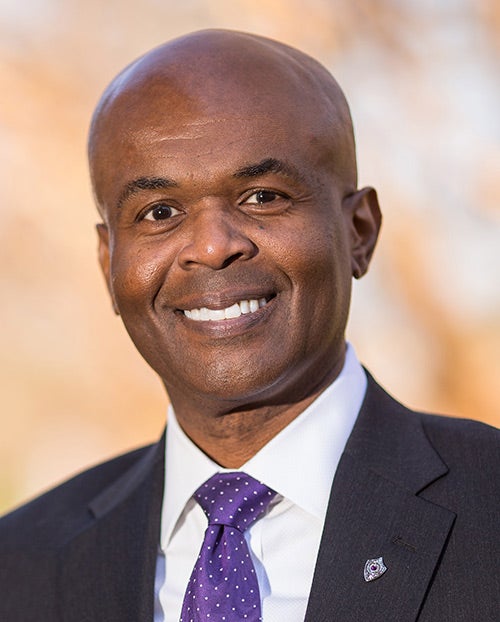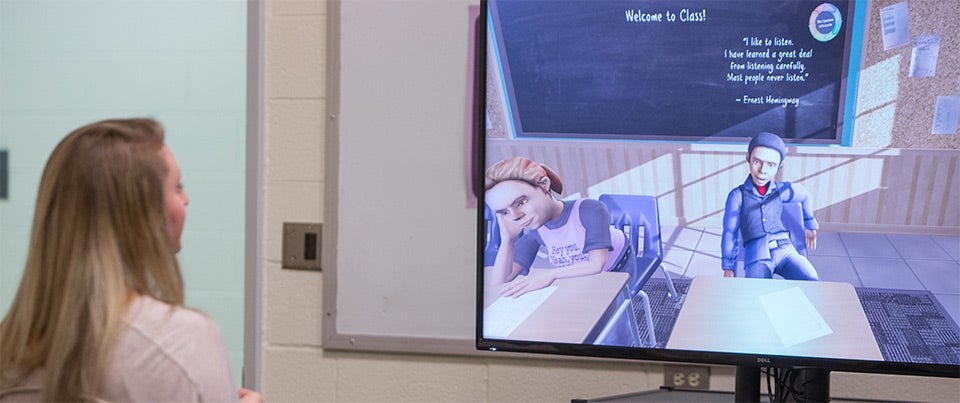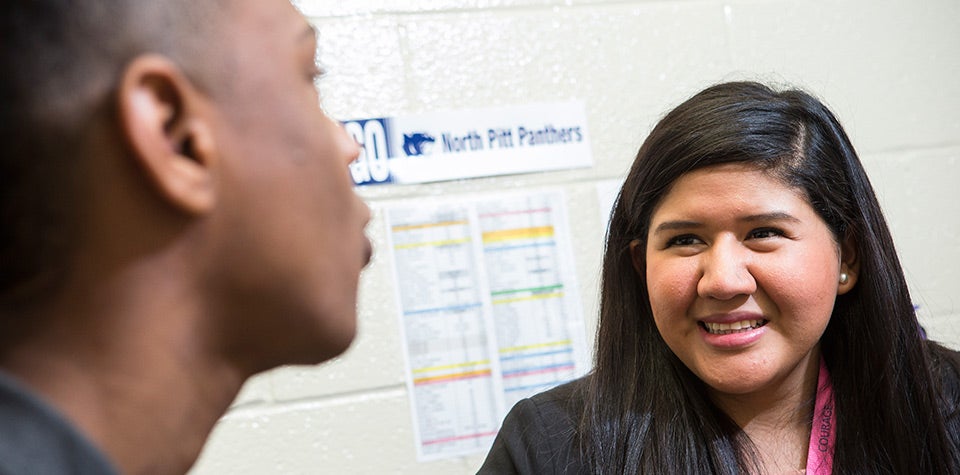MEASURING IMPACT
The College of Education embarks on three-year assessment plan
A Few Fast Facts
Below are a few preliminary samples of the data points that reveal the College of Education’s impact from a few of the college’s programs and departments.
Counselor Education:
Since August 2015, counselor education students in clinical placements contributed more than 21,000 hours of clinical counseling services worth $963,000 (based on average clinical hour rate for region) to youth, adults and families throughout the eastern NC region free of charge.
“I am currently at North Pitt High School, located in the town of Bethel completing my internship,” said Aleida Velasquez, a counselor education graduate student. “This includes but it is not limited to serving teen mothers, displaced and homebound students, students with excessive absences and the Latino community. As a first generation Latina to pursue higher education in my family, I can relate to some of the hardships that students face when they come from a disadvantaged background.”
English Education:
During the 2015-2016 school year so far, 16 English education interns contributed 1,408 days in high school English classrooms in eastern North Carolina, providing a total value to the region of $126,720 (based on Pitt County substitute teacher pay of $90/day).
History Education:
Since August 2014, history education teaching interns donated more than 600 hours of instruction and instructional support to local schools, providing a total value to the region of $54,000 (based on Pitt County substitute teacher pay of $90/day).
Library Science:
On average, 63 percent of credentialed school library media specialists in North Carolina are graduates of East Carolina University’s master of library science degree substantially impacting the student success of North Carolina school students.
Elementary Education:
Elementary education teaching interns contributed 176,874 hours of instruction and instructional support for 525 classrooms impacting approximately 12,400 kindergartener to sixth-grade students in the 2014-2015 academic year. The financial contribution of sophomore and junior interns in eastern North Carolina is $1,522,480.
Alumni:
From 1970 to 2015, eight of the 46 or 17 percent of the North Carolina Teachers of the Year were ECU alumni.
From 1984 to 2015, nine of the 32 or 28 percent of the North Carolina Principals of the Year were ECU alumni.
Currently, 20 of the 116 or 17 percent of the superintendents across the state are ECU alumni.
(Information provided by the ECU College of Education.)
East Carolina University’s College of Education is under new leadership and on a crusade for excellence.
Dr. Grant Hayes, who has been dean and distinguished professor in the College of Education since August, opened his first faculty and staff meeting asking tough questions: “What does the ECU College of Education want to be known for?” and “what can students get here that they cannot get elsewhere?”
To help the college answer these questions, department chairs are charged with working with faculty to increase the impact, performance and visibility of their work.
“Grant is resourceful and prepared,” said Dr. Art Rouse, chair of the Department of Educational Leadership. “From the time he interviewed and then came to ECU as dean, he could see that the college has major impact on the region, but it was not being told or seen by our various stakeholders.”
Before his appointment at ECU, Hayes served as interim dean of the College of Education and Human Performance at the University of Central Florida, where he held numerous leadership positions. His experience as a professor of counselor education, music teacher and administrator spans more than 27 years. He earned his doctoral, master’s and educational specialist degrees from the University of South Carolina, and his bachelor’s degree in music education from Limestone College.
‘Reclaim our profession’
Training more than 20 percent of North Carolina’s teachers, ECU’s College of Education plays a crucial role in replenishing the 10,000 teacher shortage in the state each year. ECU graduates teach in 98 of the 100 North Carolina counties and have the highest employment rate compared to all UNC system schools.
During a time when public school educators are not feeling valued, enrollment dips have plagued teacher preparation schools and colleges across the country, according to the U.S. Department of Education’s Office of Postsecondary Education. The office reported that enrollment in teacher-education programs has dropped by about 10 percent between 2004 and 2012. ECU has experienced an 18 percent decline in enrollment in its education programs, which is below the system average. The system has seen a 30 percent decline across 15 universities.
To address those issues, Hayes has implemented a three-year plan that focuses on strengthening the quality of academic programs, increasing levels of partnerships, and generating collaboration and external support for research activity.
“I hear attacks on schools and colleges of education, and I think it comes from misinformation and lack of effective communication,” said Hayes. “We need to get a different message out about our profession and what’s happening in schools and colleges of education.
“We need to reclaim our profession. People are making decisions without our voice, and ECU faculty need to be heard as leaders of these discussions,” added Hayes, who taught reading and geography in South Carolina briefly before attending graduate school.
As a first step, each department will establish benchmark data points to measure impact over time.
“It’s an analytical process that helps us and those outside the college recognize our programs, our achievements and the effect it has on others,” said Dr. Kathy Misulis, chair of the Department of Literacy Studies, English Education and History Education. “It helps all of us be more cognizant of our accomplishments and the opportunity to review them and make revisions to enhance impact, performance and visibility. It’s potentially very powerful stuff.”
In year two, departments will refine their impact statements and develop a clear metrics plan. Year three will consist of data analysis and development of each department’s first volume of data-based impact reports.
“There’s a lot of value in getting these impact statements,” said Dr. Mark L’Esperance, associate professor of middle grades education. “We can reflect and get a handle on the impact beyond our classrooms and building and into the communities and schools. It will also help with retention of faculty. If they feel valued in what they do, they will stay longer.”
To achieve these steps, Hayes challenges faculty and administrators to be focused and mindful of the realities in the field. He also asked that they remain fiscally grounded and produce an end product resistant to transient forces.
“[Faculty] can step back and ask ‘why are we doing this,’ or determine that something isn’t effective and needs to be revised to increase effectiveness and impact,” said Hayes.
The development of innovative teacher training has been an effective tool in the past several years.
New ways to prepare teachers
Changing a century-old model of student teaching, the College of Education has introduced co-teaching. Co-teaching places two interns with a teacher in the field, and they plan, deliver and assess instruction together. Currently, 111 interns are co-teaching in 91 classrooms representing seven teacher preparation programs at ECU.
Since 2011, the college has implemented edTPA, a capstone assessment taken by students before they graduate (comparable to the bar exam for law students). edTPA determines students’ readiness to enter the classroom and identifies gaps in their instruction. Students in all initial licensure programs are required to take the assessment. On average, students in nine of the 13 programs are performing better than the national average. ECU received national recognition for implementing edTPA with limited resources and for using the assessment tool to improve teacher preparation.

Dr. Grant Hayes began his role in the deanship position for the College of Education in August 2015. His focus since that time has been on achieving excellence for the college.
“Over the years, I have learned the incredible importance of making academic ideas relevant and relatable to students,” said Alexis Abbott, who is an Elizabeth City native majoring in elementary education and member of the College of Education Junior Advisory Board. “I feel as if ECU’s College of Education is shaping the education field in eastern North Carolina by producing teachers who are prepared to bring 21st century ideas into the classroom in order to help students learn.”
Recently, the college launched a pilot program with a mixed-reality classroom of fifth-grade avatars called TeachLive, which provides on-the-spot teacher training. Focusing on classroom management, the avatars have diverse personalities and learning styles that education students must react to in real-time.
“TeachLive adds to our curriculum because it’s a simulation program that is a great learning and evaluation tool,” said Dr. Ann Bullock, department chair of the Department of Elementary and Middle Grades Education. “It provides us feedback on areas we need to change. It takes a small amount of time per teacher candidate to improve and focus teaching skills. We can recognize and react to minor and major classroom scenarios, which is the most common problem for new teachers.”
With TeachLive, students can face real classroom challenges in a safe setting. “We want students to have ‘ah-ha’ moments earlier,” said Bullock.
ECU is the first university in the state to use TeachLive for teacher preparation, and like edTPA, the college seeks to be a leader in implementation. “If we can get it fully implemented into our coursework, others will look to us for guidance on how to implement it into their curriculum,” said Bullock. “It also can be used by districts to improve the skills of practicing teachers who may be having issues.”
‘Growing our own’
In response to losing good teachers to other professions and states, the college has made collaborating with a variety of partners to train and retain teachers in eastern North Carolina a priority.
The North Carolina New Teacher Support Program (NC NTSP) was established in 2012 by the University of North Carolina General Administration. ECU delivers NC NTSP professional development and coaching for teachers in their first through third year of teaching in Duplin, Hoke, Lenoir, Pamlico and Perquimans counties.
“This college is so well positioned and has a responsibility to work with K-12 partners, community colleges and industry partners,” said Hayes. “There are unique needs for rural schools and there’s a responsibility in eastern North Carolina to have the highest quality teachers in the profession and in rural schools. We also have a responsibility to provide professional development for teachers in the region.”
Funded by the State Employees Credit Union (SECU) Foundation, the SECU Partnership East program is a degree-completion partnership with 20 North Carolina community colleges from Raleigh to the Outer Banks. With a mission to “grow our own,” the program allows students interested in teaching to attend their local community college for two years and then take two years of ECU education courses online or face-to-face at a nearby site.
Since its inception in 2002, the partnership east program has prepared 674 teachers with 91 percent of those licensed and teaching children in eastern North Carolina.

Below: TeachLive is a new virtual classroom teacher preparation tool that the College of Education will incorporate into classroom management undergraduate courses.
